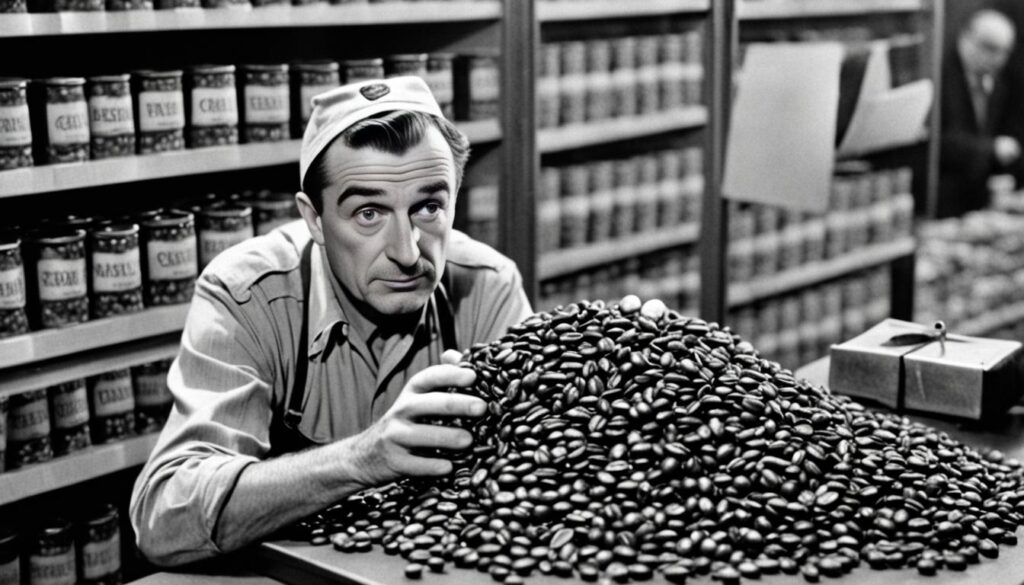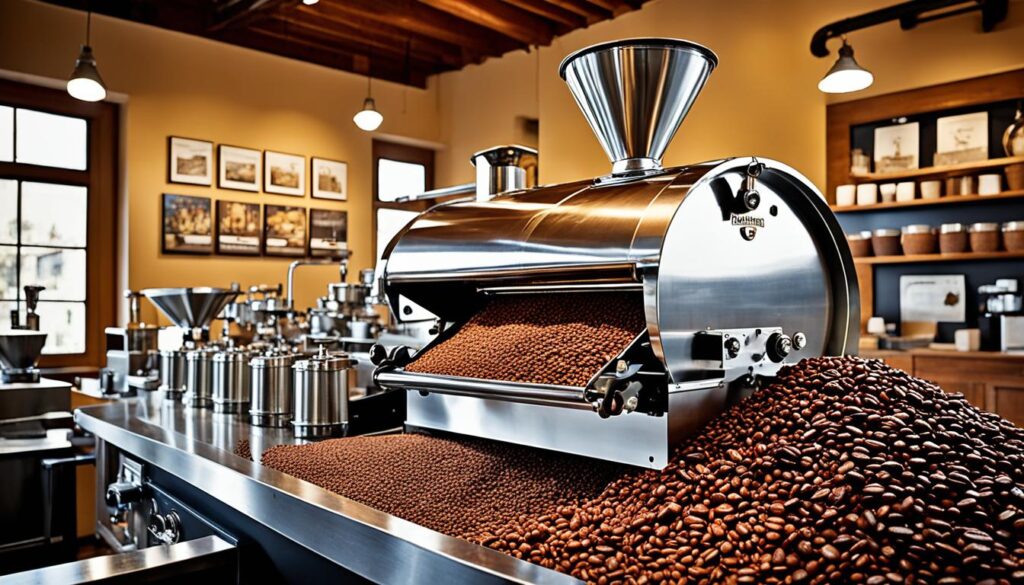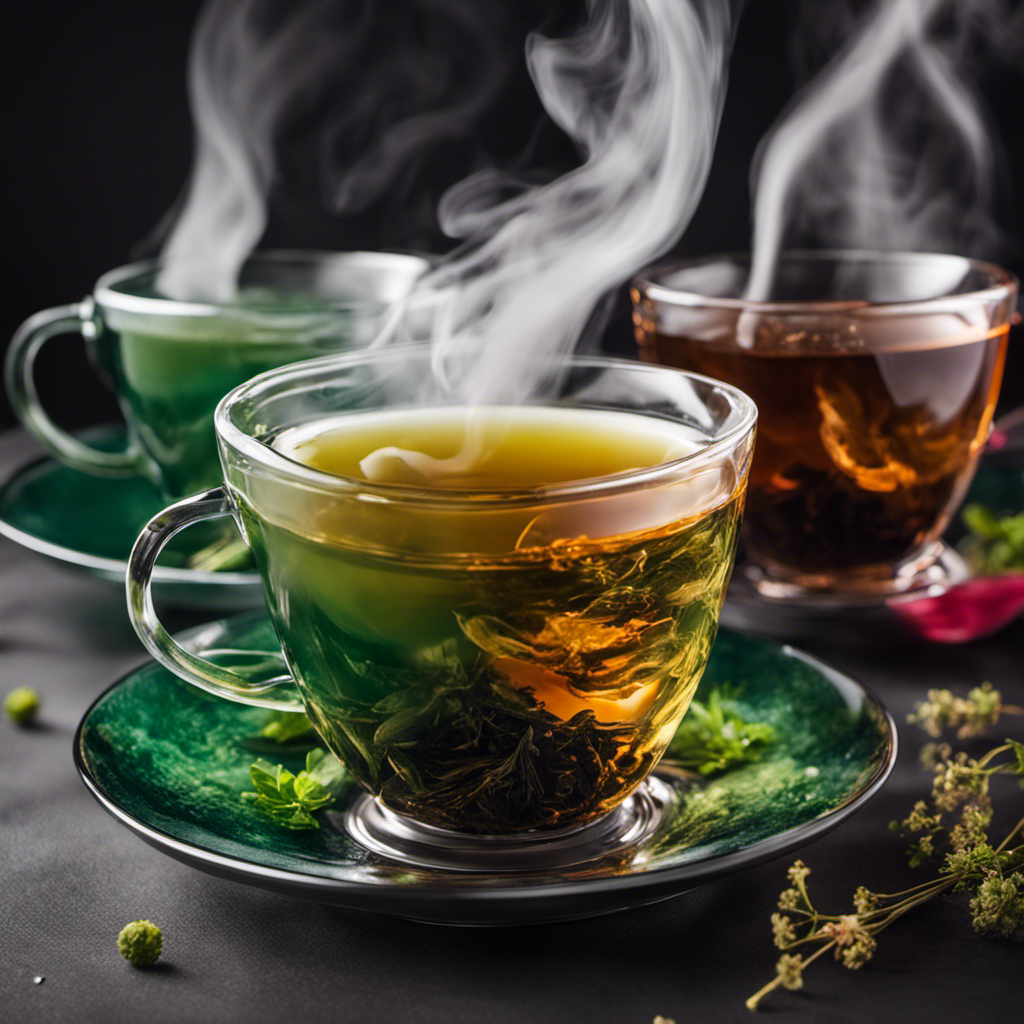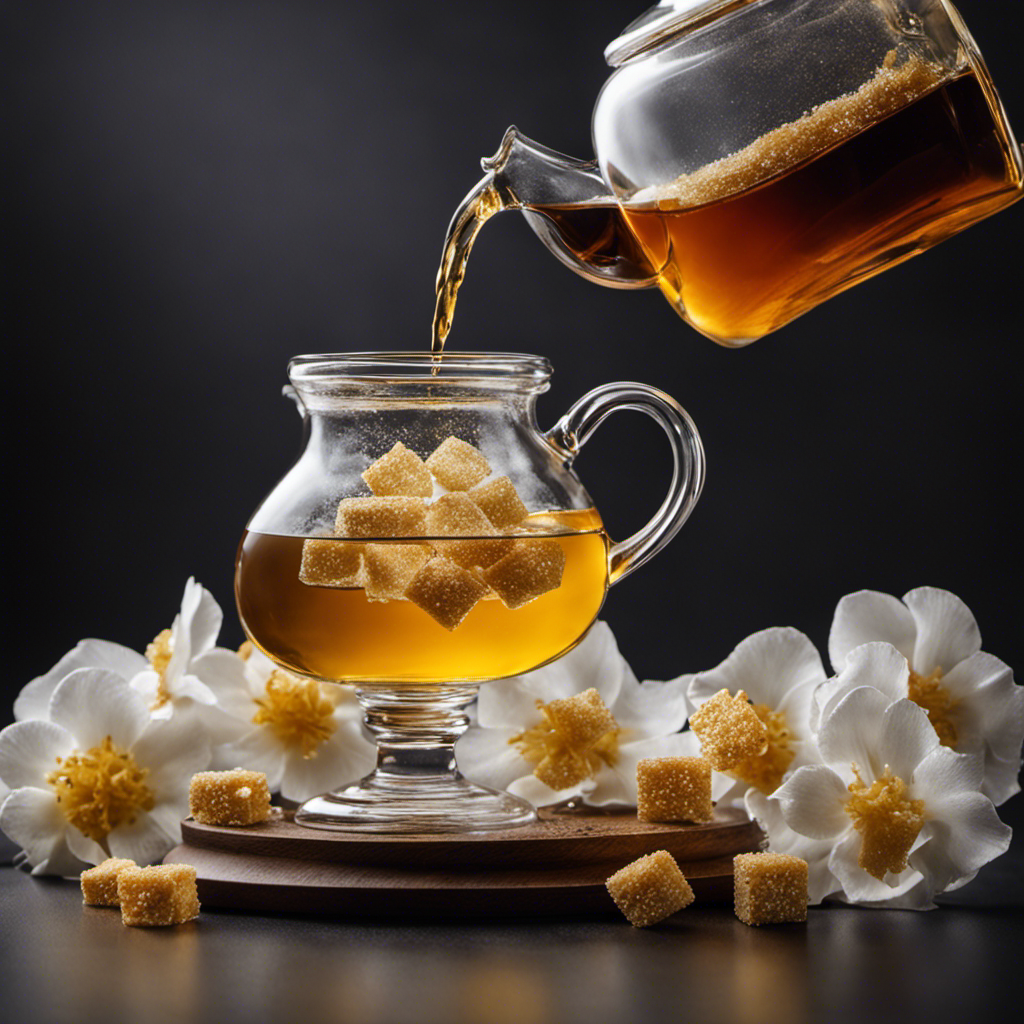Coffee Basics
Unveiling The Red Eye Coffee: A Powerful Blend For Energizing Days

Introducing the Red Eye Coffee: An Invigorating Mix for an Energized Day
In the realm of caffeinated beverages, one concoction reigns supreme: Red Eye coffee. This extraordinary blend combines the robust flavors of brewed coffee with the invigorating intensity of a shot of espresso, resulting in a truly formidable elixir.
Known by various names such as Shot in the Dark, Black Hole, Black Eye, or Depth Charge, this beverage has gained popularity among individuals seeking an unparalleled energy boost.
Originating in the United States and named after the red-eye overnight flight, Red Eye coffee embodies the spirit of staying awake and alert during trying times. Starbucks, recognizing its potency, has even developed its own naming system for this daring blend.

To create this powerful elixir, the selection of premium coffee beans is of utmost importance, ensuring optimal flavor and satisfaction. The caffeine content can vary between 200 to 400 mg, providing an electrifying surge of energy.
This article aims to delve into the variations and origins of Red Eye coffee, exploring its caffeine content, flavor profiles, and the reasons behind its widespread popularity. With a knowledgeable, detailed, and passionate approach, we will uncover the secrets behind this potent beverage, revealing the art behind its creation and the science behind its energizing effects.
Get ready to embark on a journey through the world of Red Eye coffee, where every sip promises to awaken your senses and fuel your days with renewed vigor.
Key Takeaways
- Red Eye coffee is a highly caffeinated drink made by combining brewed coffee with a shot of espresso.
- It originated in the United States and is named after the red-eye overnight flight.
- Red Eye coffee provides an electrifying surge of energy and is popular among individuals seeking an unparalleled energy boost.
- To make Red Eye coffee at home, brew a cup of coffee and prepare a shot of espresso separately, then pour the espresso shot into the brewed coffee to create the Red Eye coffee.
What is it?
Red Eye coffee, also known as Shot in the Dark, Black Hole, Black Eye, or Depth Charge, is a highly caffeinated drink made by combining brewed coffee with a shot of espresso.
To make Red Eye coffee at home, start by brewing a cup of your favorite coffee using good quality beans.
While the coffee is brewing, prepare a shot of espresso using an espresso machine or a stovetop moka pot.
Once the coffee is ready, pour the espresso shot into the brewed coffee, adjusting the number of shots depending on your desired caffeine boost.
The result is a bold and energizing drink that can provide an instant energy boost to help you stay awake and focused during exams, road trips, or busy days.
The benefits of drinking Red Eye coffee include increased alertness, improved concentration, and a boost in energy levels.
However, it is important to consume it in moderation, as the caffeine content can vary from 200 to 400 mg, depending on the number of espresso shots used.
Variations and Origins
Originating in the United States and inspired by the red-eye overnight flight, this highly caffeinated beverage is known by various names and its variations depend on the quantity of espresso shots added. Red Eye coffee is also referred to as Shot in the Dark, Black Hole, Black Eye, or Depth Charge. Starbucks has its own naming system for this invigorating drink. To better understand the variations of Red Eye coffee, a table is provided below:
Variations Number of Espresso Shots Single shot 1 Double shot 2
The origins of Red Eye coffee can be traced back to the need for an energy boost during exams, road trips, or when needing to stay awake. It is made by combining brewed coffee and a shot of espresso. The choice of good beans is crucial for enhancing the flavor of this powerful blend. The espresso is poured over the brewed coffee to create a harmonious combination. Depending on the number of espresso shots added, the caffeine content of Red Eye coffee can vary from 200 to 400 mg.
Caffeine Content and Flavors
The caffeine content of Red Eye coffee can vary depending on the number of espresso shots added and can range from 200 to 400 mg. This powerful blend is known for its ability to provide a much-needed caffeine kick, making it a popular choice for those in need of an energy boost.
In addition to its high caffeine content, Red Eye coffee also offers a variety of flavor profiles. The choice of beans plays a crucial role in determining the taste of the coffee, with different beans offering unique flavors and aromas. Exploring different brewing techniques can further enhance the flavor of Red Eye coffee.
Whether it’s a single shot of espresso or a double shot, the addition of espresso to brewed coffee creates a bold and robust flavor that is sure to awaken the senses.
Frequently Asked Questions
What is the significance of the name “Red Eye” for this coffee drink?
The significance of the name ‘red eye’ for this coffee drink lies in its origin and association with the red-eye overnight flight.
This highly caffeinated beverage, made by combining brewed coffee and a shot of espresso, is consumed for an energy boost during exams, road trips, or when needing to stay awake.
The name ‘red eye’ pays homage to the overnight flight, symbolizing the drink’s ability to keep one awake and alert, just like the red-eye flight itself.
Can Red Eye coffee be customized with different types of beans, or is there a specific bean that works best?
Customizing red eye coffee with different beans is an option, as the choice of beans can greatly impact the flavor profile of the drink.
While there is no specific bean that is deemed the best for red eye coffee, selecting high-quality beans is essential for a rich and enjoyable experience. Factors such as roast level, origin, and flavor notes should be considered when choosing beans.
Experimenting with different types of beans can allow coffee enthusiasts to create a personalized and satisfying red eye coffee.
Are there any popular additions or modifications to the basic Red Eye recipe?
Popular additions to the basic red eye coffee recipe can vary depending on personal preference. Some common modifications include adding flavored syrups, such as vanilla or caramel, to enhance the taste. Additionally, some individuals may choose to add milk or cream to create a smoother and creamier texture.
As for the choice of beans, while there is no specific requirement, it is recommended to select beans with a rich and bold flavor to complement the intense nature of the red eye coffee.
How does the caffeine content of Red Eye coffee compare to other highly caffeinated drinks?
When comparing the caffeine content of Red Eye coffee to highly caffeinated energy drinks, it is important to note that Red Eye coffee typically contains 200 to 400 mg of caffeine. This falls within the range of caffeine content found in many energy drinks, which can range from 150 to 500 mg per serving.
It is worth exploring the effects of caffeine in Red Eye coffee on productivity, as caffeine has been shown to enhance alertness, focus, and cognitive performance. However, individual tolerance to caffeine may vary, and excessive consumption can lead to negative side effects such as restlessness and insomnia.
Are there any health considerations or potential side effects to be aware of when consuming Red Eye coffee?
Potential health considerations when consuming Red Eye coffee include its impact on sleep patterns. Due to its high caffeine content, Red Eye coffee can disrupt sleep and lead to insomnia if consumed too close to bedtime. Caffeine stimulates the central nervous system, inhibiting the release of adenosine, a neurotransmitter responsible for inducing sleep.
It is therefore advised to consume Red Eye coffee in moderation and avoid it in the evening to ensure a good night’s rest.
Conclusion
In conclusion, Red Eye coffee is an invigorating blend that offers a powerful jolt of energy to those seeking an extra boost.
With its origins rooted in the U.S. and named after the red-eye overnight flight, this highly caffeinated beverage has become a popular choice for individuals needing to stay awake and alert.
With variations in names and the number of espresso shots added, Red Eye coffee offers a range of flavors and caffeine content, making it a versatile choice for those in need of an energizing beverage.
Choose your beans wisely, and let the Red Eye coffee awaken your senses and fuel your day.
Noah, the Editor-in-Chief at Cappuccino Oracle, plays a pivotal role in shaping the voice and vision of our renowned platform. With an unwavering passion for coffee, coffee alternatives, and tea, Noah leads Cappuccino Oracle towards new horizons in the realm of coffee journalism.
Beyond his professional responsibilities, Noah serves as a mentor and guiding force for his team. His dedication to journalistic excellence and genuine love for coffee, coffee alternatives, and tea continue to inspire and motivate the Cappuccino Oracle family. In the ever-evolving world of these beverages, Noah’s leadership ensures that our platform remains at the forefront, delivering enlightening and enjoyable content to our readers worldwide.
Beans
Top Ethiopian Coffee Beans that Showcase the Region’s Well-Deserved Reputation.

Discover the Best Ethiopian Coffee Brands
Ethiopia is famous as the birthplace of coffee. It has a well-developed industry for coffee farmers, an ideal climate, and a rich coffee culture, allowing it to produce some of the best coffee in the world. Coffee connoisseurs rave about the unique flavor profiles of authentic Ethiopian beans, which are known for juicy fruit, fragrant florals, and vibrant acidity.
Six Ethiopian Coffees You Shouldn’t Miss
Here are six Ethiopian coffees no coffee lover should miss, plus some tips on finding the best beans and choosing the right ones for you. Ethiopia is the 5th-largest coffee producer globally and exports the most famous coffees from Africa. So many roasters offer quality Ethiopian options. The best place to start shopping is your local coffee shop or roaster. If that doesn’t pan out or you prefer to order online, make sure you choose a roaster that roasts (and grinds) only AFTER you pay.

1. Volcanica Ethiopian Yirgacheffe Beans
Volcanica Coffee is one of our favorite coffee roasters. They balance sustainability, quality, and low price – a hard trifecta to manage in the coffee industry. The Ethiopian Yirgacheffe beans are medium-bodied, sweet, and brightly acidic. Tasters noted that it brings an ever-so-slightly bitter element to the table without upsetting the cup. This is a washed coffee with clean and complex flavors. We tasted juicy berries and bright lemon citrus, with more subtle notes of guava, milk chocolate, and lavender on the finish.
2. Peet’s Ethiopian Fancy
A high-quality dark roast Ethiopian is rare, but if anyone can do it, it’s Peet’s. The Ethiopian Fancy beans are roasted just long enough to develop incredible sweetness and caramelization without losing their Ethiopian character. Indeed, this is one of the brightest dark roasts we’ve tasted. It features sweet and tangy lemon notes and a powerful floral aroma.
3. Out of the Grey Ethiopian Oromia
Out of the Grey is a custom small-batch roaster, so every roast is given ample care and attention. The Ethiopian Oromia coffee is grown high in the mountains of Ethiopia’s Harrar coffee region in a richly biodiverse situation, guaranteeing high-quality Arabica beans. It offers compelling flavors of molasses and dark chocolate, nicely balanced by bright Asian pear and floral daffodil.
4. Perc Ethiopia Buncho Station
Perc’s Ethiopia Buncho Station comes from a single high-elevation estate, resulting in a cup of coffee that is at once both soothing and exciting. It’s incredibly sweet and juicy, with big, bold notes of blueberry and bright lemon. But that wasn’t what left our tasters wanting more; it was the perfect balancing note of vanilla that made this coffee stand out.

5. Volcanica Ethiopia Sidamo
If the first Volcanica Coffee on this list, the Ethiopia Yirgacheffe, is the classic taste of the country, think of this Ethiopia Sidamo coffee as its fun cousin. It features a fruit-forward profile with stunning sweetness and robust flavors. We tasted peaches, apricots, and pineapple acidity, with honey sweetness and just a hint of jasmine on the nose. It absolutely knocked our socks off as a cold brew.
6. Fresh Roasted Coffee Yirgacheffe
Fresh Roasted Coffee is one of the few brands we regularly buy (and recommend) from Amazon. These Yirgacheffe coffee beans deliver a mild tea-like brew, perfect for slow sipping on a weekend morning. We tasted primarily a gentle honey and caramel sweetness, with a hint of lemon acidity that is noticeable but not prominent.
How We Tested These Coffees
To generate this list of six, we sampled over a dozen single-origin Ethiopian coffees. Each coffee was brewed using two methods (pour over and French press) and tasted by at least three team members. We considered aroma, body, mouthfeel, and tasting notes. We also took freshness into account, ensuring that the coffee arrived soon after roasting.
Choosing the Right Ethiopian Coffee
There are hundreds of amazing coffees from Ethiopia available, including the six on this list. When selecting a coffee, consider your preferred brewing method and your desired flavor profile. Light and medium roasts are common and showcase fruity and floral notes, vibrant acidity, and a fragrant aroma. Also, consider the processing method, as washed and natural coffees can yield entirely distinct flavors.

Remember to check grind size if you don’t have a grinder, and be sure to explore different profiles and try multiple coffees to find your perfect brew. Coffee is seasonal, so flavors can change throughout the year. Enjoy the experience of tasting Ethiopian coffee and discover its complexity and unique flavors.
Why Ethiopian Coffee is Special
Ethiopia is distinct from all other producing countries because of the flavor profiles, production methods, the country’s history, and the plethora of plant diversity. Specialty coffee from Ethiopia showcases complex flavor profiles and bright acidity, thanks to the ideal conditions for growing premium coffee beans. Drinking coffee from Ethiopia is a special treat for any coffee fan.
So why not brew better coffee and experience the magic of Ethiopian beans?
In the vast and diverse world of coffee, coffee alternatives, and tea, Olivia has found her calling. As an author and a dedicated coffee and tea aficionado, her work for Cappuccino Oracle reflects her profound love and understanding of the intricate complexities found within these beverages. Olivia’s passion for the subject serves as both a catalyst for her creativity and a connection point with her audience.
Olivia’s appreciation for coffee, coffee alternatives, and tea blossomed at an early age. She discovered that these beverages invigorated her senses and stimulated her creative spirit. From the nuanced flavors of single-origin roasts to the captivating narratives intertwined with coffee, coffee alternatives, and tea trade and culture, Olivia found an unlimited source of inspiration in her daily cup.
Her love for these beverages and her talent for storytelling eventually converged at Cappuccino Oracle. As an author, Olivia’s mission is to illuminate the intricate tapestry that makes up the world of coffee, coffee alternatives, and tea. Her articles span a diverse range of topics, encompassing everything from the unique flavors of different brews to the sociocultural history intertwined with their cultivation and consumption.
Beans
Discover Origin of Famous Italian Coffee Beans
Uncover the global journey of premium coffee with Where Does The famous coffee Italian brand source their beans. Begin your taste adventure!

Ever wondered how Venice, famously known for its stunning canals, played a pivotal role in introducing coffee to Europe? The history of Italian coffee culture is as rich and robust as the flavors of its heavily roasted beans. Dating back to the 16th century, Venice was one of the first European states to import coffee beans. With the establishment of Caffè Florian in 1720, in Piazza San Marco, coffee houses transformed into vital hubs of intellectual and social exchange. Frequented by luminaries like Goethe and Casanova, these earliest coffee houses underscore the deep social significance of the beverage in Italy.
Moreover, during the 19th century, coffee shops in Turin became critical meeting points for Italian unification plans. The invention of the espresso by Angelo Moriondo in 1884 further revolutionized coffee culture, introducing an emblem of modernity that thrives on efficiency and social interaction. Dive into the captivating history behind these developments and discover how Italian coffee became a global phenomenon.
Key Takeaways
- Venice was instrumental in importing coffee beans to Europe in the 16th century.
- Caffè Florian, established in 1720, is the oldest operational coffee house in the world.
- Italian coffee houses were crucial for social and intellectual discourse.
- Turin’s coffee shops played a significant role in Italy’s unification efforts.
- The invention of the espresso in 1884 by Angelo Moriondo marked a new era in coffee culture.
The Fascinating History of Italian Coffee
Italian coffee traditions have profoundly shaped the nation’s history and societal evolution. From the early days of Venice’s importation of coffee beans to the pivotal roles played by iconic coffee houses like Caffè Florian, coffee has been a central aspect of Italian culture.
Caffè Florian, established in 1720 in Piazza San Marco, remains a symbol of the rich history of Italian coffee traditions, frequented by luminaries such as Goethe and Casanova.
- Venice’s Role: Venice was among the first European cities to import coffee beans, laying the foundation for a sophisticated coffee culture.
- 19th Century Coffee Shops: During tumultuous times, these establishments were integral in the backdrop of political maneuvers and the coffee unification Italy movement.
- Espresso Invention: In the late 19th century, the espresso invention by Angelo Moriondo revolutionized coffee preparation, fostering a swift, modern lifestyle.
Moving into the 20th century, Italy emerged as a forerunner in the global coffee industry. The creation of espresso stands as a hallmark of Italian ingenuity, encapsulating the nation’s move towards a fast-paced, socially interactive way of life, much like the rapid trains named after the beloved beverage. This evolution underscores how Italian coffee traditions have not only mirrored but also propelled Italy’s social and cultural dynamism through the ages.
How Venice Introduced Coffee to Europe
The introduction of coffee to Europe owes much to Venice, which pioneered the Venetian coffee trade, importing beans from the East. The city’s affinity for coffee significantly impacted coffee in European culture, making it a central part of social life and commerce.
The Birthplace of Italian Coffee Culture
Venice can be credited as the birthplace of Italian coffee culture. It was among the first places to embrace coffee, introducing it to European high society and common folk alike. Venetian merchants were instrumental in obtaining and spreading coffee, turning it into a widespread staple.
Pope Clement VIII’s “Baptism of Coffee”
An essential moment in the acceptance of coffee in European culture came with the papal approval of coffee. In the late 16th century, Pope Clement VIII tasted coffee and declared it fit for Christian consumption, effectively giving the beverage his blessing. This endorsement laid the foundation for coffee’s integration into European daily life, spreading from Venice to the rest of Europe.
The Evolution of the Espresso
The journey of the espresso is marked by significant milestones in espresso machine history and Italian coffee technology. It all began in the late 19th century and heralded innovations that continue to influence the coffee industry today.
Angelo Moriondo’s Initial Inventions
Angelo Moriondo is credited with the earliest version of the commercial espresso machine in 1884. His design used steam and water to create a fast, efficient brewing process, which was revolutionary for its time. Moriondo’s invention laid the groundwork for subsequent advancements in Italian coffee technology.
Desiderio Pavoni’s Revolutionary Design
In the early 20th century, Luigi Bezzera and Desiderio Pavoni took Moriondo’s concept further. Pavoni’s contributions in 1905 involved improving the machine’s functionality to make it user-friendly and reliable. He introduced key modifications that utilized steam pressure brewing, creating a more consistent and flavorful espresso. Pavoni’s work played a critical role in the broader adoption and popularity of espresso.
Achille Gaggia and the Modern Espresso
After World War II, Achille Gaggia revolutionized espresso machine history with his innovation in pressure extraction. By developing the lever-operated machine, he was able to produce a crema-topped espresso that remains the hallmark of modern Italian coffee technology. Gaggia’s method involved forcing hot water through finely-ground coffee at high pressure, a technique that has become the gold standard in steam pressure brewing.
| Inventor | Contribution | Impact |
|---|---|---|
| Angelo Moriondo | Initial espresso machine design using steam | Foundation for future innovations in espresso machine history |
| Desiderio Pavoni | Refinement and commercialization of espresso machines | Introduced consistent steam pressure brewing for better flavor |
| Achille Gaggia | Lever-operated machine for pressure extraction | Created the modern espresso with crema, elevating Italian coffee technology |
Major Italian Coffee Brands and Their Impacts
Italian coffee market leaders have profoundly shaped not only local but global coffee culture. Among these giants, Lavazza and Illy stand out for their pioneering contributions.
Lavazza: The Turin Pioneer
The Lavazza brand history is a tale of innovation and passion. Founded in Turin in 1895, Lavazza has spearheaded advancements in blending and packaging techniques, transforming how coffee is consumed worldwide. Over the decades, Lavazza has become synonymous with quality and innovation in the coffee industry.
Illy and the Invention of Pressurization
Illy coffee innovation has had a lasting impact on the realm of coffee storage and freshness. Established in 1933, Illy revolutionized the industry with its pressurization method, ensuring coffee remained fresh for longer durations. These innovations have elevated Illy’s reputation, distinguishing it as a key player in the world of coffee.
Both Lavazza and Illy, as Italian coffee market leaders, have not only influenced Italy but have also spread their impact globally. Their pioneering techniques and commitment to quality continue to define the Italian coffee landscape.
Where Does The Famous Coffee Italian Brand Source Their Beans
Renowned Italian coffee brands like Lavazza and Illy are celebrated for the exceptional quality of their coffee. The foundation of their unmatched flavor lies in meticulous Italian coffee beans sourcing.
These brands employ a combination of premium Arabica and Robusta blends, which are predominantly sourced from different regions around the globe. For instance, Lavazza relies heavily on Arabica beans from Brazil, prized for their mild and aromatic qualities. On the other hand, a significant proportion of their robust, full-bodied Robusta beans come from Africa, adding depth and intensity to their coffee blends.
The process of sourcing these internationally sourced coffee beans is highly stringent, ensuring only the best beans make the cut. Once the beans arrive in Italy, they are expertly blended to create distinctive flavor profiles unique to each brand. Specialized packaging methods such as vacuum sealing and pressurization are then employed to maintain the freshness and aroma of the coffee.
Ultimately, this careful sourcing and blending of Arabica and Robusta blends sustain the high standards of Italian coffee, ensuring that every cup delivers the rich and satisfying experience that these iconic brands are known for.
| Brand | Primary Source of Arabica Beans | Primary Source of Robusta Beans | Special Packaging Method |
|---|---|---|---|
| Lavazza | Brazil | Africa | Vacuum Sealing |
| Illy | Brazil | Africa | Pressurization |
This commitment to superior Italian coffee beans sourcing ensures that every cup not only meets but exceeds the expectations of coffee enthusiasts worldwide.
Impact of World War II on Italian Coffee
World War II cast a long shadow over Italian coffee culture, marked significantly by the World War II coffee shortage caused by stringent embargos. These conditions forced many Italians to turn to substitutes such as barley and chicory. The Italy coffee embargo created a deep craving for the real beans, profoundly affecting the country’s coffee traditions.
As the war ceased, Italians used the hardships endured during the World War II coffee shortage as a catalyst for remarkable post-war coffee innovation. Amid these challenging times, figures like Achille Gaggia rose to prominence, introducing groundbreaking methods in pressure extraction. These innovations not only restored but revitalized the Italian coffee experience, signifying a resilient leap in the face of adversity.
Analyzing the era:
| Period | Challenges | Responses | Innovations |
|---|---|---|---|
| World War II | Embargo on Coffee Imports | Use of Substitutes (e.g., Barley) | – |
| Post-War | Rebuilding Coffee Culture | Return to Authentic Beans | Pressure Extraction Methods (Achille Gaggia) |
The impacts of these events underscore the critical role that adversity played in driving the nation’s coffee-centric progress, reflecting both the significance of the World War II coffee shortage and the subsequent post-war coffee innovation.
The Cultural Importance of Coffee in Italy
In Italy, coffee is far more than just a beverage—it represents an integral aspect of the nation’s social fabric. From the morning rush to grab a quick cappuccino to the serene enjoyment of an after-dinner espresso, these coffee moments are ingrained in Italian daily life coffee rituals, facilitating social interactions and community bonding.
Social and Daily Rituals Centered Around Coffee
Espresso bars serve as vibrant social hubs where friends, colleagues, and even strangers meet, reinforcing espresso social customs that emphasize connection and conviviality. The day in Italy often begins with a cappuccino or a caffè latte, accompanied by a pastry, while the post-lunch espresso serves as a quick energy boost. These activities aren’t merely habitual but are embedded in the cultural ethos.
Regional Coffee Variations
The diverse landscapes and culinary traditions of Italy contribute to unique regional coffee specialties. For instance, in the Marche region, one might savor a caffè anisette, flavored with anise. In contrast, Sicily offers a rich caffè d’un parrinu, infused with regional spices, reflecting a profound integration of local traditions into the coffee experience.
| Region | Specialty Coffee | Description |
|---|---|---|
| Marche | Caffè Anisette | An espresso with a hint of anise |
| Sicily | Caffè d’un Parrinu | Espresso infused with local spices |
| Veneto | Caffè Corretto | Espresso with a splash of grappa |
| Naples | Caffè alla Napoletana | Strong espresso with a creamy foam |
Types of Italian Coffee Drinks
Italian coffee culture is diverse, spanning a range of signature Italian coffee varieties that cater to different tastes and occasions. From robust morning espressos to creamy cappuccinos, each beverage offers a unique experience for coffee connoisseurs.

The Espresso: Italy’s Signature Coffee
The espresso stands at the heart of Italy’s coffee tradition. This concentrated shot of coffee, known for its intense flavor and aromatic crema, is a staple in Italian daily life. Typically consumed quickly while standing at a bar, it embodies both efficiency and enjoyment.
Cappuccino, Caffè Latte, and Latte Macchiato
When it comes to the milky coffee tradition, Italy offers an array of options. The cappuccino, a blend of equal parts espresso, steamed milk, and foam, is a popular breakfast choice. Caffè latte, comprising more milk and less foam, provides a milder flavor, while the latte macchiato features steamed milk with a hint of espresso, creating a layered visual appeal. These beverages are often enjoyed mid-morning and embody the regional espresso twists Italy is known for.
Special Regional Coffees
Italy’s regional variants showcase the country’s culinary ingenuity. For example, caffè anisette from Marche infuses espresso with a touch of anise liqueur, adding a distinctive flavor profile. In Sicily, caffè d’un parrinu includes a blend of spices like cinnamon and cloves. These special regional coffees not only enhance the signature Italian coffee varieties but also underline the diverse cultural fabric woven into Italy’s coffee traditions.
The Rise of the Espresso Machine
The journey of the espresso machine is a testament to the remarkable strides in coffee appliance innovation. From its early stages to becoming a staple in households worldwide, the espresso machine has fundamentally transformed the way coffee is consumed and appreciated.
From Prototype to Household Appliance
The development of the espresso machine began with Angelo Moriondo’s initial patent in 1884, which laid the foundation for future advancements. As espresso machine development progressed, inventors like Luigi Bezzera refined the initial designs, making the machines more efficient and accessible. Ultimately, it was Desiderio Pavoni who commercialized these inventions, spreading the culture of espresso far and wide.
The Spread of Espresso Bars in Italy
The rise of espresso bars revolutionized Italian coffee bar culture. As these machines became more sophisticated, they enabled rapid and consistent preparation of high-quality coffee. Espresso bars soon became social hubs, where the experience of enjoying a cup of coffee was intertwined with daily life and community interaction. This spread across Italy, with notable coffee appliance innovations enhancing the brewing process, thus amplifying the cultural importance of espresso. These advancements fostered an environment where coffee was not just a beverage but a central element of Italian social life.
| Year | Inventor | Major Contribution |
|---|---|---|
| 1884 | Angelo Moriondo | Initial patent for the espresso machine |
| 1901 | Luigi Bezzera | Refinements to improve efficiency |
| 1905 | Desiderio Pavoni | Commercialization of the espresso machine |
Italian Coffee Roasting Techniques
Italian coffee roasting techniques have long been celebrated for producing intensely flavored cups. However, the debate between dark roasts and medium-light roasts is gaining attention as modern roasters focus more on enhancing coffee bean quality and flavor complexity.
The Debate: Dark Roast vs Medium-Light Roast
Traditionally, the Italian roasting profile favors dark roasts, known for their bold, robust flavors. Dark roasting techniques dominate in Italy, delivering a rich taste that’s a hallmark of Italian coffee. However, medium-light roasts, which preserve the subtle flavors and higher acidity, are emerging in popularity. This shift aims to highlight the inherent qualities of the beans themselves, marking a significant evolution in Italian roasting techniques.
Modern Italian Roasters and Quality Focus
Modern Italian roasters are increasingly emphasizing coffee bean quality over traditional darker profiles. By incorporating sustainable sourcing methods and precision roasting profiles, these roasters aim to elevate Italian coffee to new standards. They are meticulous in controlling the roast to enhance the flavor complexity and ensure each cup reflects the distinct characteristics of the beans.
Here’s a detailed comparison of the two roasting profiles:
| Aspect | Dark Roast | Medium-Light Roast |
|---|---|---|
| Flavor Profile | Bold, robust | Subtle, complex |
| Acidity | Low | High |
| Bean Quality Emphasis | Less focused on nuanced flavors | More focused on preserving bean characteristics |
| Sourcing and Sustainability | Traditional sourcing | Emphasis on sustainability |
As the industry evolves, Italian roasters are striking a balance between honoring their rich traditions and embracing innovative methods to enhance coffee bean quality and roasting profiles. This harmonious blend of old and new promises to keep Italian coffee at the forefront of global coffee culture.
The Role of Italian Coffee Houses in Society
Italian coffee houses have played a crucial role in shaping the country’s social and cultural landscape. These establishments, such as the renowned Caffè Florian in Venice and various historic Italian cafés in Turin, have been pivotal in fostering intellectual discourse and societal interactions.

Historic Cafés and Their Influence
The social impact of coffee houses in Italy cannot be overstated. Historic Italian cafés like Caffè Florian, established in 1720, have served as meeting points for prominent figures, artists, and writers. These cafés became epicenters of culture, providing a space for ideas to flourish and societies to engage in contemporary discussions. The significance of Caffè Florian extends beyond just serving coffee; it has been a witness to centuries of socio-political evolution.
Caffè Florian and Turin’s Coffee Shops
Turin’s coffee shops have also left an indelible mark on Italy’s history. During critical periods such as the Italian unification, these establishments became the backdrop for revolutionary ideas and movements. The significance of Caffè Florian and other notable cafés in Turin underscores the profound social impact of coffee houses in Italy, transforming them into enduring symbols of intellectual and societal progression.
The Influence of Italian Immigrants on Global Coffee Culture
The global spread of Italian coffee has been significantly influenced by the contributions of Italian immigrants. These pioneers, carrying the essence of Italian coffee culture, introduced their deep-rooted espresso traditions and various innovations to new lands.
How Italians Spread Coffee Culture Abroad
Italian immigrants have played a pivotal role in the propagation of coffee culture worldwide. They often established coffee shops in their new communities, bringing the authentic experience of Italian coffee to various corners of the globe. This effort included the introduction of iconic espresso machines and dark roast coffee beans, essential elements of the Italian coffee experience.
Impact on Modern Coffee Trends
The influence of Italian immigrants extends beyond mere replication of their native coffee traditions. Their contributions to coffee culture have shaped modern coffee trends significantly. The meticulous attention to quality and the introduction of sophisticated coffee brewing techniques have inspired the specialty coffee movement. This global spread has led to a heightened appreciation for the intricacies of coffee, fostering a culture marked by a preference for high-quality, well-crafted coffee experiences.
Famous Italian Coffee Quotes and Anecdotes
Italian coffee is more than a beverage; it has become an essential part of the culture and a source of endless inspiration for memorable phrases. These sayings reflect the deep connection Italians have with their coffee, often highlighting the joy it brings to daily life.
One popular Italian coffee saying is, “Un buon caffè è come un’amore sincero: entrambi lasciano un sapore dolce ma intenso.” Translated, it states, “A good coffee is like a sincere love: both leave a sweet but intense taste.” This sentiment beautifully demonstrates the affection Italians hold for their coffee, making it evident why the espresso and other coffee drinks are engrained in their daily rituals.
“Piazza, bim, bom, il caffè è pronto: resta zitto e aspetta.”
This charming phrase underscores the quintessential Italian coffee experience: sitting in the heart of a bustling piazza, waiting patiently for the joy of that first sip. The words capture the cultural essence of coffee not only as a drink but as a moment of quiet reflection amidst the hustle and bustle of life.
Espresso culture in Italy is also rich in anecdotes that add to its allure. It’s said that Ernest Hemingway found solace in the espressos at Caffè Gilli in Florence, where he enjoyed the artistic and caffeinated environment. Such espresso cultural references highlight the café as a sanctuary for creative minds seeking inspiration in every rich, aromatic cup.
In a delightful blend of travel and coffee, an old Italian coffee-related quote humorously remarks, “Il miglior caffè? Quello che prendi con gli amici, ovunque nel mondo.” (“The best coffee? The one you have with friends, anywhere in the world.”) This emphasizes the social aspect of coffee, a philosophy that resonates from the cozy coffee bars of Rome to the charming cafes of Venice.
These Italian coffee sayings and coffee-related quotes vividly convey the importance of coffee in Italy, making it clear that this drink is far more than a simple refreshment; it’s a cultural cornerstone that adds flavor and warmth to life’s most cherished moments.
Unique Coffee Traditions Across Italy
Italian coffee culture is rich in diversity, offering a fascinating glimpse into regional Italian coffee recipes that highlight the country’s culinary creativity. Each region boasts unique flavors and preparation methods, capturing the essence of local traditions and ingredients.
Marche’s Anise-Infused Espresso
In the picturesque region of Marche, locals enjoy a distinctive twist on the classic espresso with the addition of anise. This anise espresso Marche combines the robust flavors of espresso with the aromatic, licorice notes of anise, creating a complex and invigorating blend.
Sicily’s Spice-Infused Coffee
Sicily offers its own unique contribution to the world of coffee with its spice-infused variety. Known as Sicilian spiced coffee, this drink incorporates a blend of spices that add warmth and depth to the rich coffee base, reflecting the island’s vibrant culinary heritage.

| Region | Specialty Coffee | Main Ingredients |
|---|---|---|
| Marche | Anise-Infused Espresso | Espresso, Anise |
| Sicily | Spice-Infused Coffee | Espresso, Various Spices |
Conclusion
Italian coffee, with its origin tracing back to Venetian trade routes, encapsulates a remarkable journey from historic European coffee houses to becoming a global phenomenon. This enduring legacy is not just about the beverage, but the profound social customs, technological advancements, and gastronomical innovations it has inspired.
The story of Italian coffee is a testament to its cultural significance. From the first coffee houses of Venice, like Caffè Florian, to revolutionary inventions such as the espresso machine, Italy has left an indelible mark on global coffee culture. The rich tapestry of Italy’s coffee heritage is a blend of tradition and modernity, continuously redefining social interactions and culinary experiences.
In essence, Italian coffee is more than a drink; it is a symbol of cultural identity and a dynamic force in the coffee narrative worldwide. As it continues to evolve, it retains its essence, providing a glimpse into Italy’s heritage while influencing modern coffee trends. The Italian passion for coffee, embodied in every espresso, reflects a culture deeply rooted in history, yet ever forward-looking.
FAQ
What is the origin of famous Italian coffee beans?
How has Italian coffee evolved over history?
How did Venice introduce coffee to Europe?
What advancements were made in espresso machine technology?
Which are the major Italian coffee brands and their impacts?
Where do famous Italian coffee brands source their beans?
How did World War II impact Italian coffee culture?
What is the cultural significance of coffee in Italy?
What are some popular types of Italian coffee drinks?
How did the proliferation of espresso machines influence Italian coffee culture?
What are traditional and modern Italian coffee roasting techniques?
What role do Italian coffee houses play in society?
How have Italian immigrants influenced global coffee culture?
Can you share some famous Italian coffee quotes and anecdotes?
What are some unique coffee traditions across Italy?
In the vast and diverse world of coffee, coffee alternatives, and tea, Olivia has found her calling. As an author and a dedicated coffee and tea aficionado, her work for Cappuccino Oracle reflects her profound love and understanding of the intricate complexities found within these beverages. Olivia’s passion for the subject serves as both a catalyst for her creativity and a connection point with her audience.
Olivia’s appreciation for coffee, coffee alternatives, and tea blossomed at an early age. She discovered that these beverages invigorated her senses and stimulated her creative spirit. From the nuanced flavors of single-origin roasts to the captivating narratives intertwined with coffee, coffee alternatives, and tea trade and culture, Olivia found an unlimited source of inspiration in her daily cup.
Her love for these beverages and her talent for storytelling eventually converged at Cappuccino Oracle. As an author, Olivia’s mission is to illuminate the intricate tapestry that makes up the world of coffee, coffee alternatives, and tea. Her articles span a diverse range of topics, encompassing everything from the unique flavors of different brews to the sociocultural history intertwined with their cultivation and consumption.
Coffee Basics
Collector’s Cravings: Top 10 Must-Have Starbucks Merchandise

Do you have a passion for collecting? Are you in search of one-of-a-kind Starbucks merchandise to add to your collection? You’ve come to the right place!
We have compiled a list of the top 10 must-have items that will satisfy your collector’s cravings. From limited edition mugs to rare and vintage finds, we have something for every passionate collector out there.
So, join us as we embark on this journey to discover the most coveted Starbucks merchandise. Let’s dive in!
Key Takeaways
- Limited edition Starbucks merchandise includes innovative mugs, collaboration with renowned artists, and attention to detail in handle designs, reflecting Starbucks’ commitment to quality and creativity.
- Starbucks tumblers are functional vessels and style statements, with a growing collection and a wide range of options to suit every taste, making them a cherished part of daily routines.
- Collectible keychains reflect personality and interests, with a hunt for unique and rare collectibles, including vintage and limited edition keychains that hold value and are made from unconventional materials.
- Starbucks Reserve Exclusives offer unique and limited edition coffee blends sourced from the finest and most unique coffee beans, meticulously crafted by expert roasters, showcasing bold and earthy flavors as well as complex and nuanced notes.
Limited Edition Mugs
We absolutely love collecting limited edition mugs from Starbucks. As avid collectors, we’re always on the lookout for unique pieces that showcase limited edition prints and innovative designs.
Starbucks never fails to impress us with their diverse range of limited edition mugs. Each mug tells a story, whether it’s a collaboration with a renowned artist or a celebration of a special occasion. The limited edition prints on these mugs capture the essence of Starbucks and its commitment to quality and creativity.
One thing that sets these mugs apart is the attention to detail, especially in the handle designs. From whimsical shapes to intricate patterns, the handles add an extra touch of charm to the overall design.
These limited edition mugs aren’t just functional, but they also serve as beautiful art pieces that can elevate any coffee-drinking experience.
Trendy Tumblers
Trendy tumblers are a hot commodity among Starbucks collectors, with their unique designs and the latest trends in drinkware. From vibrant floral patterns to sleek metallic finishes, these tumblers aren’t only functional but also fashionable.
Collecting Starbucks tumblers has become a passion for many, as they strive to complete their collection and stay up-to-date with the newest releases.
Tumbler Designs and Trends
As Starbucks enthusiasts, we’re always on the lookout for new tumbler designs and trends to add to our collection. The world of Starbucks tumblers is constantly evolving, offering us exciting ways to personalize and accessorize our beloved cups.
Here are three current discussions that have been buzzing among our community:
-
Tumbler Customization: We love the ability to customize our tumblers with our names, favorite quotes, or even our zodiac signs. It adds a personal touch and makes our tumblers truly unique.
-
Reusable Straw Options: With the growing concern for the environment, Starbucks has introduced reusable straw options for their tumblers. From sleek metal straws to colorful silicone ones, we can now enjoy our drinks guilt-free.
-
Limited Edition Designs: Starbucks never fails to surprise us with their limited edition tumbler designs. From holiday-themed cups to collaborations with renowned artists, these limited editions are a must-have for any collector.
With all these exciting discussions surrounding tumbler designs and trends, it’s no wonder why collecting Starbucks tumblers has become a passion for many of us.
Collecting Starbucks Tumblers
Our collection keeps growing with each new Starbucks tumbler design, and we’re always on the lookout for limited edition releases. As avid collectors, we understand the thrill of finding unique Starbucks tumblers that stand out from the crowd.
These tumblers not only serve as functional vessels for our favorite beverages but also make a style statement. From sleek stainless steel options to vibrant ceramic designs, Starbucks offers a wide range of tumblers to suit every taste.
And let’s not forget about the popular tumbler accessories that enhance our collection. From colorful silicone grips to handy straw lids, these accessories add a personal touch and make our tumblers even more versatile.
Whether we’re sipping our morning coffee or enjoying a refreshing iced tea, our Starbucks tumblers are a cherished part of our daily routine.
Collectible Keychains
We love hunting for unique keychains to add to our ever-growing collection. Keychains aren’t just functional accessories, but they also serve as a reflection of our personality and interests. When it comes to customized keychains, we’re always on the lookout for rare collectibles that stand out from the rest.
Here are three items that have recently caught our attention:
-
Vintage Keychains: These timeless pieces take us back in time with their nostalgic designs and craftsmanship. From retro movie posters to iconic logos, vintage keychains add a touch of history to our collection.
-
Limited Edition Keychains: We’re always excited to get our hands on limited edition keychains that are released for special events or collaborations. These exclusive pieces not only showcase our dedication to collecting, but they also become valuable mementos of a particular moment in time.
-
Unique Materials: Keychains made from unconventional materials like wood, leather, or metal are always sought after. These keychains not only add diversity to our collection, but they also showcase the creativity and innovation of the designers.
Starbucks Reserve Exclusives
When we heard about the new Starbucks Reserve Exclusives, we couldn’t wait to try their unique and limited edition coffee blends.
Starbucks Reserve Blends are a true testament to Starbucks’ commitment to sourcing the finest and most unique coffee beans from around the world. Each coffee blend is meticulously crafted by Starbucks’ expert roasters, ensuring that every cup delivers an exceptional and unforgettable experience.
From the bold and earthy flavors of their single-origin offerings to the complex and nuanced notes of their small-lot coffees, Starbucks Reserve Exclusives truly exemplify the artistry and passion of coffee making. These blends aren’t just coffee, they’re a journey through the diverse landscapes and cultures where the beans are grown.
Indulge in the richness of flavors and let Starbucks Reserve Exclusives transport you to the heart of coffee perfection.
Artistic Ceramic Collections
Although we’re collectors of Starbucks merchandise, we’re particularly fascinated by the artistic ceramic collections they offer. The ceramic art market is a treasure trove of unique pottery styles, and Starbucks has capitalized on this by creating stunning ceramic pieces that not only serve a functional purpose but also double as beautiful works of art.
Here are three reasons why we can’t get enough of Starbucks’ artistic ceramic collections:
-
Exquisite craftsmanship: Each ceramic piece is meticulously crafted, showcasing the skill and expertise of the artisans involved. From delicate hand-painted details to intricate textures, these ceramics are a testament to the dedication and talent of the artists.
-
Variety of designs: Starbucks offers a wide range of designs, catering to different tastes and preferences. Whether you prefer minimalist aesthetics or vibrant patterns, there’s a ceramic collection that will capture your heart.
-
Limited editions: Starbucks frequently releases limited edition ceramic collections, making them highly sought after by collectors. These limited editions not only add exclusivity but also increase the value of the pieces over time.
Specialty Drinkware
We love collecting specialty drinkware because it adds a touch of exclusivity to our Starbucks merchandise collection.
Limited edition tumblers and exclusive holiday mugs are the ultimate must-haves for any Starbucks enthusiast.
These unique pieces not only showcase our love for coffee, but also serve as a statement of our dedication to the brand.
Limited Edition Tumblers
We love the limited edition tumblers that Starbucks releases each season, and we can’t wait to get our hands on the newest one. These tumblers aren’t just ordinary drinkware; they’re a statement of our style and love for Starbucks.
Here are three reasons why we’re obsessed with these limited edition tumblers:
-
Unique Designs: Each tumbler is meticulously designed with intricate patterns, vibrant colors, and eye-catching graphics. It’s like holding a work of art in our hands.
-
Collectible Appeal: These limited edition tumblers create a sense of exclusivity and rarity. Being part of a limited number of people who own these tumblers is exciting and makes us feel special.
-
Personalization Options: Starbucks offers personalized tumblers where we can add our names or favorite quotes. It adds a personal touch and makes the tumbler feel truly ours.
These limited edition tumblers are more than just a way to enjoy our favorite Starbucks beverages. They’re an expression of our individuality and love for all things Starbucks.
Exclusive Holiday Mugs
The exclusive holiday mugs are flying off the shelves faster than we can say ‘caffeine fix’. These limited edition holiday tumblers have become the latest obsession among Starbucks enthusiasts and collectors alike.
With their festive designs and intricate details, these holiday themed mugs are the perfect addition to any coffee lover’s collection. From cheerful snowflakes to whimsical reindeer, each mug tells a unique story that captures the spirit of the holiday season. It’s no wonder these mugs are in such high demand.
Whether you’re sipping your morning brew or enjoying a cozy evening by the fireplace, these mugs add a touch of magic to every moment. So, if you haven’t already, hurry to your nearest Starbucks and grab one of these exclusive holiday mugs before they disappear!
Iconic City Series
Have you seen the new mugs from the Iconic City Series? They’re simply captivating! As passionate Starbucks enthusiasts, we couldn’t resist sharing the details about these city-inspired merchandise. Here’s why we’re head over heels for them:
-
Authenticity: Each mug showcases the unique charm of iconic Starbucks locations around the world. From the bustling streets of New York City to the serene beauty of Paris, every design is a visual love letter to these remarkable cities.
-
Exquisite craftsmanship: The mugs are meticulously crafted with attention to detail, featuring intricate illustrations and vibrant colors that bring each city to life. Holding these mugs feels like holding a piece of the city in your hands.
-
Collectible value: These mugs are a must-have for any Starbucks collector. With limited availability, they’re sure to become sought-after treasures, making them a wise investment for those who appreciate both beauty and rarity.
Collaborative Merchandise
Exploring new and exciting collaborations is always a thrilling way to expand our merchandise collection. We’re constantly on the lookout for unique collaborations that bring together the best of different worlds. Collaborative merchandise allows us to offer our customers something truly special and one-of-a-kind. These partnerships allow us to bring together different brands, artists, and designers to create products that are both innovative and captivating.
Through these collaborations, we’re able to create merchandise that resonates with our customers on a deeper level. Whether it’s a limited-edition collection with a popular fashion brand or a collaboration with a local artist, these unique partnerships allow us to offer merchandise that reflects the diverse tastes and interests of our customers.
As we delve into the world of collaborative merchandise, we’re excited to introduce our new ‘collector’s edition gift sets’. These exclusive sets will feature a curated selection of merchandise from our most popular collaborations, providing our customers with a truly special and memorable way to enjoy their favorite products.
Collector’s Edition Gift Sets
We are thrilled to announce that our exclusive collector’s edition gift sets are now available for purchase. These meticulously curated sets are designed to delight and satisfy the avid collectors among us. Each set includes a selection of our most sought-after merchandise, packaged beautifully for gifting or personal indulgence.
Here are three highlights from our collector’s edition gift sets:
-
Collector’s Edition Pins: These exquisite enamel pins feature iconic Starbucks designs that are sure to make a statement on any collector’s pin board. With their intricate detailing and vibrant colors, these pins are a must-have for any Starbucks enthusiast.
-
Limited Edition Water Bottles: Stay hydrated in style with our limited edition water bottles. These sleek and durable bottles are adorned with unique designs that showcase the Starbucks brand. Whether you’re hitting the gym or simply on the go, these water bottles are a fashionable and functional choice.
-
Exclusive Packaging: Each collector’s edition gift set comes in a specially designed box that adds an extra touch of luxury. Crafted with attention to detail, the packaging enhances the overall experience of owning these coveted items.
Don’t miss out on the chance to own these exclusive collector’s edition gift sets. Indulge yourself or surprise a fellow Starbucks lover with these exceptional treasures.
Rare and Vintage Finds
Let’s dive into the world of rare and vintage finds with a curated selection of Starbucks memorabilia from yesteryears, including limited edition mugs and collectible pins.
In today’s discussion, we want to take you on a journey back in time to discover the hidden gems that coffee enthusiasts and collectors crave. Picture yourself sipping a cup of vintage coffee from a rare Starbucks mug that tells a story of the brand’s rich history. Imagine wearing a collectible pin that showcases the iconic Starbucks logo from years gone by.
These rare Starbucks items not only reflect the passion and dedication of the brand, but they also hold sentimental value for those who appreciate the art and craftsmanship behind them.
Frequently Asked Questions
How Can I Purchase Limited Edition Mugs and Tumblers From Starbucks?
To purchase limited edition mugs and tumblers from Starbucks, we recommend employing strategic purchasing strategies.
Keep an eye out for announcements of upcoming releases on social media and the Starbucks website. Act quickly when new merchandise drops, as it often sells out fast.
Consider joining the Starbucks Rewards program to gain access to exclusive offers and early access to limited edition items.
Don’t forget to visit your local Starbucks store, as they may have unique merchandise not available online.
Happy collecting!
What Are Some of the Most Sought-After Collectible Keychains From Starbucks?
When it comes to Starbucks keychain designs, there are a few that stand out as the most sought-after collectibles. These popular Starbucks keychains feature unique designs and are highly coveted by collectors.
From adorable mini coffee cups to miniature versions of iconic Starbucks mugs, these keychains are the perfect way to show off your love for Starbucks while on the go.
Are Starbucks Reserve Exclusives Available in All Starbucks Stores?
Starbucks Reserve exclusives are highly sought after by collectors. These exclusive releases aren’t available in all Starbucks stores, as they’re part of the Starbucks Reserve merchandise line. However, you can find these special items in select Starbucks Reserve locations.
It’s worth visiting these stores to get your hands on these unique and limited edition items. Starbucks understands the importance of catering to the desires of their loyal customers and collectors.
What Are Some Unique Features of the Artistic Ceramic Collections Available at Starbucks?
Artistic ceramic collections at Starbucks offer unique features that are a must-have for any collector or coffee enthusiast. These collections showcase intricate designs and vibrant colors, making them visually stunning pieces of art.
The attention to detail is evident in the craftsmanship, with each ceramic item being carefully handcrafted.
These collections not only add a touch of elegance to your coffee routine but also serve as a way to express your love for Starbucks and its merchandise.
Can I Find Specialty Drinkware That Is Specific to a Particular Starbucks Location or City?
Oh boy, do we’ve something exciting to share with you!
When it comes to Starbucks, we know that collectors out there just can’t get enough. And guess what? You can find specialty drinkware that’s specific to a particular Starbucks location or city!
Yes, you heard that right. Starbucks has a wide range of merchandise that celebrates the uniqueness of each location.
Conclusion
After exploring the world of Starbucks merchandise, we’ve unearthed the top 10 must-have items for collectors.
From limited edition mugs to rare vintage finds, there’s something for every Starbucks enthusiast.
Whether you’re a fan of trendy tumblers or artistic ceramic collections, these pieces are sure to enhance your Starbucks experience.
So, whether you’re sipping your favorite brew at home or showing off your collection to friends, these coveted items will make you feel like a true Starbucks connoisseur.
Happy collecting!
Noah, the Editor-in-Chief at Cappuccino Oracle, plays a pivotal role in shaping the voice and vision of our renowned platform. With an unwavering passion for coffee, coffee alternatives, and tea, Noah leads Cappuccino Oracle towards new horizons in the realm of coffee journalism.
Beyond his professional responsibilities, Noah serves as a mentor and guiding force for his team. His dedication to journalistic excellence and genuine love for coffee, coffee alternatives, and tea continue to inspire and motivate the Cappuccino Oracle family. In the ever-evolving world of these beverages, Noah’s leadership ensures that our platform remains at the forefront, delivering enlightening and enjoyable content to our readers worldwide.
-

 Americano4 weeks ago
Americano4 weeks agoHow to Make Americano With Moka Pot
-

 Americano2 weeks ago
Americano2 weeks agoHow to Make Korean Iced Americano
-

 Americano4 weeks ago
Americano4 weeks agoHow to Make Iced Americano With Instant Coffee
-

 Americano4 weeks ago
Americano4 weeks agoHow to Make Americano With Bialetti
-

 Americano4 weeks ago
Americano4 weeks agoHow to Make Dutch Bros Americano
-

 Americano6 days ago
Americano6 days agoHow to Make an Iced Americano With Nespresso
-

 Americano2 weeks ago
Americano2 weeks agoHow Many Shots of Espresso for 16 Oz Americano
-

 Turmeric Tea1 week ago
Turmeric Tea1 week agoTurmeric Saffron Tea

















